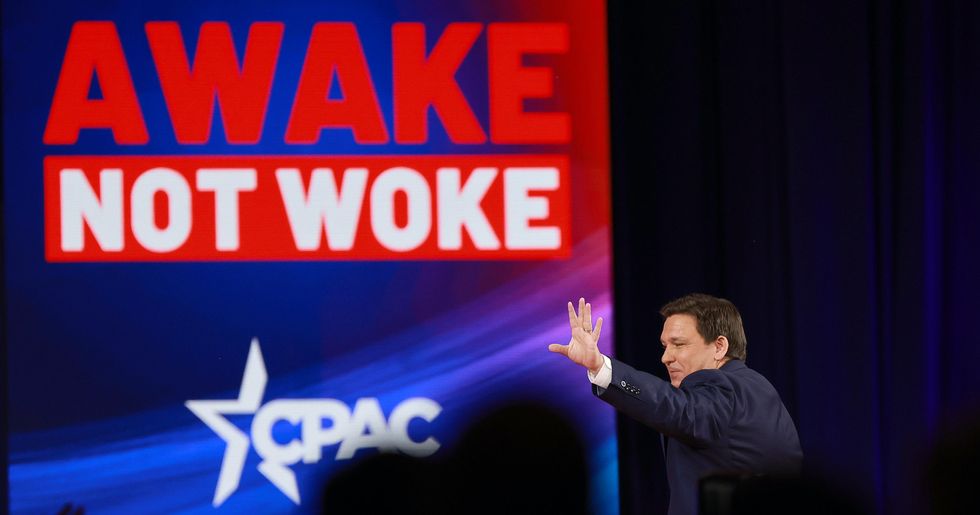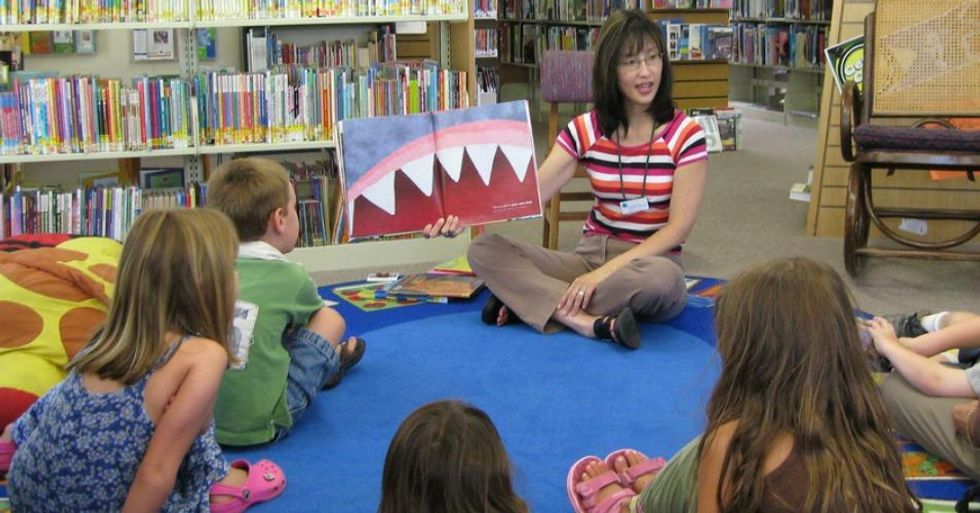Widening the lens on the escalating assault on education and those who teach it offers chilling thoughts on the future of U.S. democracy.
From book bans to classroom demonizing trans youth and LGBTQ lives, to eradicating the real history of the U.S. and its ongoing legacy on racial and gender oppression, to the intimidation of educators and purging those who don't toe the line, global parallels with where this repression leads should set off alarms.
Chile provides a case study. After the 1973 coup, led by August Pinochet with U.S. support against democratically elected Socialist President Salvador Allende, "the military seized control of campuses and swept out those they felt sympathized with Allende rule," as the Christian Science Monitor put it.
Active-duty generals were appointed to run the universities and primary and secondary schools were placed under the rule of mayors appointed by Pinochet to promote full government control of classroom instruction.
Targeting educators was a priority with strict penalties imposed on what could be taught, leading to the firing of thousands of university professors and teachers, while others were forced out by sweeping cuts in educator pay.
Privatization, sharp cuts in public education funding, and corporate control of curricula was a major goal, including the elimination of political science and sociology in favor of vocational and business programs, and banning of texts.
The cuts and restrictions "sharply increased economic discrimination in higher education," said Allende's former education superintendent Iván Núñez, producing a privatized, corporatized school system that became more elitist. Implicit was the recognition that an egalitarian education system produces generations of young people who study the society they live in, think critically, and pose a major impediment to dictatorial rule. It would take 17 years until democracy finally was restored in Chile.
Comparisons with Nazi Germany are always fraught with overstatement. But it is worth emphasizing Hitler's reign started not with death camps, but with an onslaught on education and those it deemed as undesirables. Just weeks after Hitler's rise to Chancellor in 1933, Germany enacted a Civil Service law that as historian Jarrell Jackman wrote in The Muses Flee Hitler, immediately "forced over 1,000 scholars from their academic positions as either 'politically unreliable' or 'non-Aryan'."
On May 10, 1933, Nazi student groups carried out book burnings in 34 university towns across Germany.
Comparisons with Nazi Germany are always fraught with overstatement. But it is worth emphasizing Hitler's reign started not with death camps, but with an onslaught on education and those it deemed as undesirables.
On the bonfires went some 25,000 "un-German" books especially those by Jewish writers from Albert Einstein to Sigmund Freud, socialists, and communists, like Bertolt Brecht, August Bebel, and, of course, Karl Marx, literary and political critics of fascism and the Nazi regime, and foreigners considered advocates of social justice, such as Helen Keller targeted for championing rights for women, workers, and the disabled.
Speaking at the largest boon bonfire in Berlin, propaganda minister Joseph Goebbels would declare that "Jewish intellectualism is dead" and he endorsed the students' "right to clean up the debris of the past." In the prescient words of banned, 19th century Jewish poet Heinrich Heine, "Where they burn books, they will also ultimately burn people."
"Nazi mentality," wrote Jackman, "held that only a small segment of humankind belonged among the chosen citizenry" and that the 'undesirables' should be '"segregated from the rest of society." Those defined as "non-Aryan" or undesirables—which would also include people of color, lesbians and gays, the disabled, Gypsies, socialists, communists and any other opponents of the regime "were linked together in one form of conspiracy to destroy the purity of the German Volk."
"Since everyone was either supportive of German purity, or too scared to speak up for fear retribution, the Nazi Party could push any policy they wanted," writes Julia Rittenberg, calling it "a necessity for dictatorial control. Fascist leaders seek to crush any thoughts that might encourage resistance to their regime."
U.S. history is stuffed with examples of racial and gender oppression, repression of those viewed as "undesirable," censorship of education and history, and book banning, all intended to suppress any perceived threat to the dominant political class and white supremacy. In the wake of Trump's demagogy and attempted coup, the past two years illustrate the most dangerous illustration of those attacks on democracy.
Last year alone, more than 1,600 books were banned from school libraries, involving 138 school districts in 32 states, according to a report from PEN America.
Books sympathetically portraying diversity, especially featuring LGBTQ individuals and works, including children's books, describing struggles against racism by Black, Latino and civil rights figures, and human sexuality lead the list.
In Tennessee where one school district notoriously banned the graphic novel series "Maus" about the Holocaust, Rep. Jerry Sexton, sponsor of a bill to police school libraries, said he would burn books he considered inappropriate. A Texas school district official told educators if they kept books about the Holocaust in their classrooms, they would be required to offer "opposing" viewpoints to comply with a new state law.
Since January, 2021, reportsEducation Week, 44 states have introduced bills or taken other steps to restrict teaching critical race theory or limit how teachers can discuss racism and sexism; 18 states have imposed the bans and restrictions either through legislation or other avenues.
After heavy criticism from Florida Gov. Ron DeSantis, a likely leading candidate for President in 2024, the national College Board on the first day of Black History Month this February released an official curriculum for its new Advanced Placement course in African American Studies that stripped key parts of its content.

On top of the DeSantis' infamous "Don't Say Gay" and "Stop Woke Act," bills, a bill introduced in late February would bar colleges and universities from spending any money to fund educational programs or activity that promotes diversity, equity, and inclusion, and could eviscerate programs on African American, gender studies, and other vulnerable curriculum.
Historian Robin D.G. Kelly describes these moves as "attacking the whole concept of racial justice and equity. It's an ongoing struggle to roll back anything that's perceived as diminishing white power. They want to convince white working people… if they can get control of the narrative inside classrooms, their lives would be better. Racism actually damages all of our prospects and futures."
As in Chile and Germany, educators are a major target. Multiple bills have threatened teachers with discipline, including termination, fines, criminal penalties, and loss of their teaching credentials for perceived violation of the laws, including the complaint of even one parent.
In Texas, Republican officials have called for criminal charges against school officials who make certain books available to young adults.
In New Hampshire, a conservative mom's group is offering a $500 bounty to catch teachers who break a state law prohibiting certain teachings about racism and sexism.
A high school English teacher in Missouri lost her job following parents' complaints that one of her assignments taught critical race theory after assigning a worksheet titled "How Racially Privileged Are You?" as prep material for reading the school-approved book "Dear Martin," a novel about a Black high school student who is physically assaulted by a white police officer.
In Tennessee, a teacher was fired after telling her class that white privilege is a fact. In Texas, a Black principal lost his job after parents accused him of promoting critical race theory based on a letter he had written more than a year earlier, calling for the community to come together and defeat systemic racism in the days following the murder of George Floyd.
DeSantis and Florida are again leading the charge. A substitute teacher in Jacksonville, was fired after posting a video to Twitter showing rows of empty bookshelves at the school's library.
DeSantis insisted the video was fake, even though in Duval County Public Schools administrators also instructed faculty to cover or remove their classroom libraries, mentioning the felony risk in a video on how to comply with the new law.
Another teacher near Naples, FL was fired after a classroom discussion prompted by LGBTQ students asking if they could create art expressing their own sexualities and identities.

DeSantis has also gone after teacher unions, seeking to defund them, along with other restrictions, and the newest bill would allow a faculty member's tenure to be reviewed "at any time."
Activists across the country are fighting back. In Indiana, for example, a coalition of organizations mobilized to defeat two anti-critical race theory bills after a Republican state senator urged teachers to be impartial on "isms," and a history teacher went viral for saying he refuses to be impartial when teaching Nazism.
And, in New Hampshire, a group called Granite State Progress boasted wins in all 34 of the school board races where it supported candidates who pledged to resist pressure to restrict the teaching of the history of racism.
"The history of Nazi book burning is one of the most obvious antecedents to the censorship of books in the U.S.," notes Julia Rittenberg. "While book banners and censorship supporters paint their concerns as specific to contemporary issues, it's a common way to consolidate power."
In a commentary in the New York Times, prominent historian, educator Henry Louis Gates cited the work of historian Carter Woodson, pioneer in 1926 of what has become Black History Month. Woodson was "keenly aware of the role of politics in the classroom," said Gates, "if you can control a man's thinking, you do not have to worry about his action."
This content originally appeared on Common Dreams and was authored by Chuck Idelson.
Chuck Idelson | Radio Free (2023-02-28T18:34:27+00:00) Burning Books and Destroying Education on the Path to Fascist Dictatorship. Retrieved from https://www.radiofree.org/2023/02/28/burning-books-and-destroying-education-on-the-path-to-fascist-dictatorship/
Please log in to upload a file.
There are no updates yet.
Click the Upload button above to add an update.